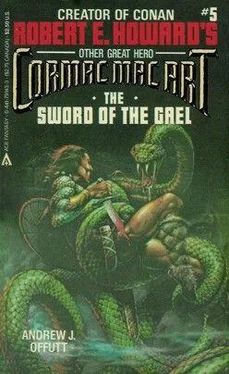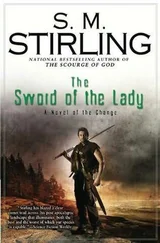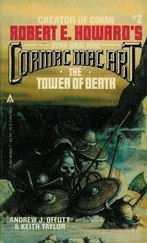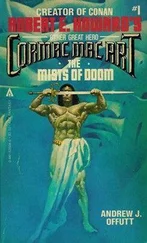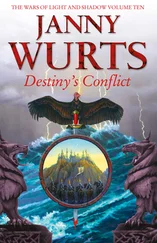Andrew Offutt - The Sword of the Gael
Здесь есть возможность читать онлайн «Andrew Offutt - The Sword of the Gael» весь текст электронной книги совершенно бесплатно (целиком полную версию без сокращений). В некоторых случаях можно слушать аудио, скачать через торрент в формате fb2 и присутствует краткое содержание. Жанр: Фэнтези, на английском языке. Описание произведения, (предисловие) а так же отзывы посетителей доступны на портале библиотеки ЛибКат.
- Название:The Sword of the Gael
- Автор:
- Жанр:
- Год:неизвестен
- ISBN:нет данных
- Рейтинг книги:3 / 5. Голосов: 1
-
Избранное:Добавить в избранное
- Отзывы:
-
Ваша оценка:
- 60
- 1
- 2
- 3
- 4
- 5
The Sword of the Gael: краткое содержание, описание и аннотация
Предлагаем к чтению аннотацию, описание, краткое содержание или предисловие (зависит от того, что написал сам автор книги «The Sword of the Gael»). Если вы не нашли необходимую информацию о книге — напишите в комментариях, мы постараемся отыскать её.
The Sword of the Gael — читать онлайн бесплатно полную книгу (весь текст) целиком
Ниже представлен текст книги, разбитый по страницам. Система сохранения места последней прочитанной страницы, позволяет с удобством читать онлайн бесплатно книгу «The Sword of the Gael», без необходимости каждый раз заново искать на чём Вы остановились. Поставьте закладку, и сможете в любой момент перейти на страницу, на которой закончили чтение.
Интервал:
Закладка:
Finding a pair of strange high boots of soft doeskin, Samaire coveted them for her own. She contrived to equip their tops with holes, through which she threaded strips of hide. These she fastened in turn to her belt, which was broad as her waist and fastened with a buckle nigh as big as her hand. The buckle they hoped all would assume was brass, for who would believe it for what it was: many coins’ weight of solid gold! The boots came halfway up her thighs, to where her scarlet tunic fell.
One trek they made from palace to the Viking ship, which waited safe and dry on the beach where they’d hidden it. All were laden with food and ale, for they’d found no fresh water. And back they went, and returned to the ship again, groaning and staggering under the weight of booty: gold and silver and gems and fine leather. A third journey through that narrow defile from shore to palace brought forth more booty, and many weapons-and Ceann’s prize, a small harp. He strummed it, and pronounced it a fine instrument.
“Never,” Wulfhere rumbled, “have I had thought of sailing the sea with a prince as minstrel!”
“Nor ever have I had thought of sailing the ship playing the lute for a Dane as big as a tree!” Ceann retorted, and the two men laughed together.
Chapter Seven: “The sea is angry!”
Their ocean-god was Mannanan Mac Lir,
Whose angry lips,
In their white foam, full often would inter
Whole fleets of ships…
– D’Arcy McGee: The Celts
Built in the clinker way of the Scandinavians, the ship was small and light, no more than sixty feet long. Her crew of four left her light in the water, despite their having heavy-laden her with food and ale and the Vikings’ booty.
The quartet would be able to handle her well enough, with her one sail, and with Cormac’s and Wulfhere’s experience. They’d need it, as well as their strength, if heavy winds rose. True, they needed near-perfect sailing conditions; there’d be little the four of them could do with fourteen sets of oars.
South of Britain as they were, they could not sail directly to Eirrin. A direct northeasterly bearing would carry them into the realm of the Wind Among the Isles that had hurled them here-and the whirlpool off the island called Ire of Manannan. They must head westward before bringing about on a northerly bearing, and then at last swing northeast to seagirt Eirrin.
With a nice little breeze rippling the sea and blowing their hair, they raised and braced the mast and made ready to hoist sail. Cormac already thought of this island as Serpent’s Lair, since it was that deep-laired reptile that had nigh got him his death. But he said nothing when, as they prepared to depart, Wulfhere called it otherwise.
“Farewell, Samaire-heim,” he said and received a smile and a thanks for the inspiration for that Irish-Danish name.
Away and out from Samaire-heim they slid, and with ease. Skirting the rocks and bearing away from the islands, Cormac and the Dane did their best to impart to their Leinsterish companions the mysterious lore of seamanship. Soon they were clear, and stood forth to open sea. With smooth sailing, Ceann began testing his new smallharp, plucking and strumming. After a time he raised his excellent tenor in song.
“I sing of rescue, and a giant from the land of the Danes,” the slender redhead said, and Wulfhere blinked and strove not to swell his chest.
“His beard is a bush of flame,
His ax a stout tree of steel;
His legs the sturdiest of oaks,
His wrath like a forest afire.
He splits the Norsemen’s shields
On the edge of his great red ax;
He vents the armour, of them all,
He breaks the bones of the Vikings!”
Grinning broadly, Wulfhere struck a pose at the prow, his chest like a great iron bound barrel and his fiery beard jutting. Fighting a smile, Cormac turned away.
“How fares Eirrin?” he asked, of her who had persuaded him to return.
It was Ceann made reply:
“Summery Eirrin! Delightful time!
How beautiful the colour;
The blackbirds trill the full day;
The cuckoos sing in constant strains.
Now welcome is the twice-noble
Brilliance of the sun’s seasons!
On the marge of the branchy woods
Summer swallows skim the streams,
The swift horses seek the pool.
The heather spreads her long hair;
High grows the fair bog-down-
Flowers cover the earth of Eirrin!”
Smiling, Cormac continued to look on Samaire’s face.
“How fares Eirrin? Fair and beautiful, son of Art. Flax and corn crowding the very foothills of Mount Leinster. Silver and gold still pushing up out of the ground without digging of it, and singing peasants wear carbuncles while stout branches break from the weight of their fruit.”
“Another poet!” Wulfhere cried grinning, while Cormac bellied up a short laugh.
“How fares Eirrin?” he repeated.
“Leinstermen still resist the Boru Tribute,” Samaire said. “But he is a good High-king, is Erca Tireach. The land basks in his wisdom and his peace, and the sons and daughters of Eirrin see to the business of Eirrin whilst the rest of the world wars like rival ants.”
“His peace! ” Cormac burst out. “The business of Eirrin…” He shook his head. “Gaels of Eirrin should be carving out fine haunch and tenderloin of Britain as from a roast at fair-time! It’s these eighty years since Alaric and his Goths carried the sword into the streets of Rome, and the legions and administrators torn out of Britain after five centuries and more, like the legs from an old table. Now it’s Saxons and Jutes and Angles are creating what they call kingdoms of Britain. Kingdoms! Kings without the price of fivescore sheep, and with three hundred subjects-even less! Britain’s ripe for the taking, and it’s being taken! Where be the sons of Niall when there lies a land next door, like a jewel-coffer with the lid open?”
“Tamed,” Ceann said.
Cormac stared at him. “Tamed! Eirrin? Gaels? Why man it was in Gaul over the wide seas that Niall got his death, and him chasing the Romans all the way from Londinium in Britain! Can the descendants of such a warrior be tamed? ”
“Not all,” Samaire said quietly, gazing upon the son of Art. She had clamped her teeth at the mention of the death of Niall of the Nine Hostages. For it was a king’s son of her Leinster had slain the great conqueror-king whose descendants still reigned, and that skulking from ambush.
Ceann only shook his head. “That,” he said, “was before Padraigh came to Eirrin.”
“Padraigh!” The name tore from Cormac’s lips like a curse. “And him mealymouthing about peace and love your neighbour! Why, by neighbour that maniac meant Vikings , and Jutes and Picts, and those that have yet to crawl from beneath their slime-bottomed rocks! Would that Padraigh were alive that I might aid him along in his blitheful journey to the afterworld of his weakling’s god! Tell me-is’t true what I heard tell in Britain, that his strange faith has stolen even our New Year’s and the Vigil of it?”
Samaire sighed. “Aye, and the mistletoe of the Druids as well, and the Behlfire of Midsummer’s. As to the ancient New Year-aye, the Christians have… borrowed it. Samain they claim is dedicated to all the souls of Christendom, and its vigil they call the Hallowed Eve of All Saints. As to the festival-time of winter, that has been such for Celts these thousands of years-it’s then Bishop Patricius-Padraigh-says the son of the Christian god was born, and that we celebrated it in honour of this Eastern man-god.”
Читать дальшеИнтервал:
Закладка:
Похожие книги на «The Sword of the Gael»
Представляем Вашему вниманию похожие книги на «The Sword of the Gael» списком для выбора. Мы отобрали схожую по названию и смыслу литературу в надежде предоставить читателям больше вариантов отыскать новые, интересные, ещё непрочитанные произведения.
Обсуждение, отзывы о книге «The Sword of the Gael» и просто собственные мнения читателей. Оставьте ваши комментарии, напишите, что Вы думаете о произведении, его смысле или главных героях. Укажите что конкретно понравилось, а что нет, и почему Вы так считаете.
